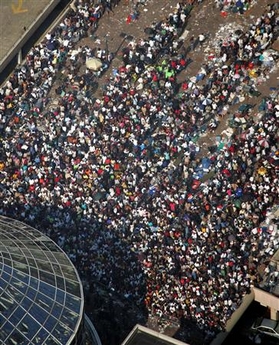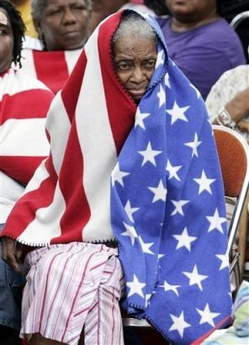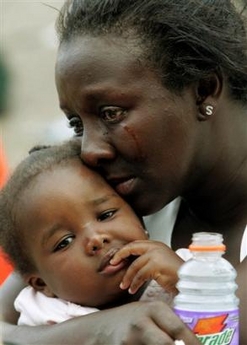Relief, rage, and passing the buck
Today, according to the Globe and Mail, President Bush
- expressed unhappiness with the efforts so far to provide food and water to hurricane victims and to stop looting and lawlessness in New Orleans. "The results are not acceptable," said Mr. Bush, who rarely admits failure.
- Even Republicans were criticizing Mr. Bush and his administration for the sluggish relief effort. "I think it puts into question all of the Homeland Security and Northern Command planning for the last four years, because if we can't respond faster than this to an event we saw coming across the Gulf for days, then why do we think we're prepared to respond to a nuclear or biological attack?" said former House Speaker Newt Gingrich.
But here's a brief synopsis. The relief effort is finally making some headway, four days after Hurricane Katrina clobbered parts of Louisiana and Mississippi. Private charities like the Salvation Army and the Red Cross are doing their part. Some individuals are showing the beautiful side of human nature, opening up their homes to the homeless and raising money for the relief effort. (A welcome reminder amidst all the stories of looting and violence.)
Meanwhile, the survivors continue to suffer. They are evidencing every extreme of human emotion.
As before, all photos are culled from the hundreds available at news.yahoo.com. If you are are moved to make a donation, you might consider Mercy Corps. Only 8% of your money will go to administration, which is minimal. But give to the charity of your choice — I'm just making it as easy as possible for everyone to contribute what they can.

consider the sheer magnitude of the task
(/David J. Phillip/Pool/Reuters)
Thousands wait to be evacuated from the Louisiana Superdome in New Orleans, September 2, 2005.

in a patriotic mood … or maybe not
(AP Photo/Eric Gay)
Milvertha Hendricks, 84, waits in the rain with other flood victims outside the convention center in New Orleans, Thursday, Sept. 1, 2005.

frantic for food and water
(AP Photo/Eric Gay)
A military helicopter makes a food and water drop near the Convention Center in New Orleans, Thursday, Sept. 1, 2005.

unabated rage
Reuters/Jason Reed
Hurricane Katrina survivors taunt a National Guardsman for arriving too late to help some who have died waiting for food and water, just before food distribution by the National Guard at the New Orleans Convention Center, September 2, 2005.

growing accustomed to waiting
(AP Photo/Eric Gay)
Members of the National Guard direct hundreds of flood victims to a line to receive water and food at the convention center, Friday, Sept. 2, 2005.

tedium
(AP Photo/Dave Martin)
New Orleans residents wait at the evacuation staging area on Interstate-10 in Metarie, La., Thursday, Sept. 1, 2005. Thousands of residents of the flood besieged city are seeking a way out of New Orleans. Officials were airlifting the evacuees to the staging area where they loaded buses bound for the Astrodome in Houston.

overwhelmed by a wave of grief
(AP Photo/Eric Gay)
A woman cries as she waits with other flood victims at the Convention Center in New Orleans, Thursday, Sept. 1, 2005.

faith, hope, and love, these things last;
but the greatest of them is love
(AFP/Paul Richards)
Residents receive food from a Salvation Army facility, one of many stations around Mobile, Alabama, and other areas.

food!
Reuters/Joe Skipper
Raheem Johnson, 7, of Biloxi, Mississippi, eats a hot meal at a Salvation Army mobile canteen in a Biloxi neighborhood severely damaged by Hurricane Katrina, September 2, 2005. Black leaders on Friday condemned the slow response to the devastation caused by Hurricane Katrina and said poor and mostly black storm victims in New Orleans were bearing the brunt of the suffering.

A Good Samaritan
(AP Photo/M. Spencer Green)
James W. Pazz eats his breakfast while Corie January, right, talks to her son Gage in Bay St. Louis, Ms., on Friday, Sept. 2, 2005. Pazz opened his doors to eight families (twenty people in total) who lost their homes in Hurricane Katrina.

two of the Good Samaritan's beneficiaries
(AP Photo/M. Spencer Green)
Ashley Green and three-month-old daughter Jenna-Ray Chasteen lying on a mattress outside James W. Pazz's home.

never too young to learn compassion
Reuters/Seth Wenig
From left to right: Emily McCormick, 11, her mother Lisa Headley, and her friend Catrina Fleischmann, 8, donate a bag full of money they earned at their bake sale in New York city, September 2, 2005. The children sold out in under two hours, earning $413 for the victims of Hurricane Katrina. The New York Red Cross is helping to handle the overwhelming amount of calls from around the nation and is also accepting monetary donations at their locations around the city.

a little light breaks through the clouds
Reuters/Joe Skipper
Three-year-old Makia Hebert rides his bicycle after his mother had found it under the debris of their Biloxi, Mississippi home September 2, 2005.

rescued but her pain continues
(AP Photo/Dave Martin)
Sheila Dixon of New Orleans weeps as she clutches her 18-month-old daughter Emily as they sit on the side of Interstate-10 after being airlifted out of flood-besieged New Orleans on Wednesday, Aug. 31, 2005. Dixon wept uncontrollably, saying that everything she had was lost and she had no idea where she was being taken.


6 Comments:
Great posting job, Q! Thanks for taking the time to put together such a well-rounded array of poignant graphics.
BTW, I concur with the former house speaker's conclusions. Bad show. In my grading system, considering the entire week's output, they earned the following:
NOLA city goverance - D minus
LA state goverance - D
US Admin governance - C minus
Overall grade - D
Not nearly good enough!
Thanks, 49er. I don't know how many of the visitors to my site have dial-up service, but they may not thank me for posting 14 photos.
I don't want to play politics with this issue. Behind the criticism of the Bush administration lies genuine concern for the thousands of men, women, and children in misery, who waited four days for something to happen.
btw, the Globe and Mail had a reporter at the convention center in New Orleans on Friday. She reported:
Everyone from President George W. Bush on down is now talking cheerfully about all the aid pouring into the New Orleans area.
But virtually none had arrived by day's end [Friday] — only heavily armed reinforcements for the local New Orleans police, much-praised by the refugees here for their kindness, if not their ability to do anything.
I appreciate your input because you make an important point: the criticism must be spread wider than just the Bush administration. I believe the governor of New Orleans is a Democrat (though I'm a bit fuzzy on these things, being a Canadian). So it isn't a simple matter of Republicans bad, Democrats good.
For those who are wondering why 49er places more blame on local governments than on the feds, 49er explained his rationale in an earlier comment:
US law places upon local and state administrations, and not the feds, the responsibility for performing every manner of disaster planning and response. The fed support was in place and available. But the local effort was ill-planned.
Again I point out that I'm a Canadian, so I can't speak to US law. But I think Gingrich raises a valid point about Homeland Security, which is why I quoted him.
In the event of a terrorist attack, isn't Homeland Security responsible to provide quick relief on a grand scale? In the event of a terrorist attack, are they going to sit back and wait for the state government to organize a relief effort? What if the attack takes out the state government or the infrastructure within the state?
For the Bush administration and for the American people, this disaster was a perfect test case for Homeland Security. And I think you grade them too generously when you give them a C minus.
Q
Thanks for continuing to focus on the human side of this tragedy.
Q may be right about the grade, but I've seen nothing, yet, to lower it further. An MSNBC special Saturday night on previous major hurricane disasters elicted the information that in Florida, after "Andrew" in 1992(?), in which everything worked fairly well, the National Guard relief units carrying supplies and security forces, showed up in force the morning of the fourth day, much to the relief of the victims struggling to just barely survive until help arrived.
If that telecast was accurate, wasn't it Thursday this week that the military convoy with relief supplies arrived on the flooded streets of NOLA? Whether that time lag is acceptable or reasonable, is another question.
The anwwer to Q's earlier query is the DHS uses multiple levels of responders, local, county [parrish], state and federal. (The theory being the closer to the event, the faster the response). That system worked fairly well in Florida, Mississippi and Alabama.
Why it didn't in NOLA, I'm sure, will be the subject of extremely close scrutiny in the coming years.
But none of that will help the victims we've lost, nor the hundreds of thousands who are almost certainly permanently displaced.
This raises so many questions. Surely the city of NO has/had some type of emergency plan.
Did they invoke it and if so, what went wrong. What about the state's involvement and of course what happened to FEMA and the Fed.
What a horrid situation.
• Mary P. has been asking another pointed question: why would government officials move thousands of people to the convention center and the Superdome, but not arrange basic supplies like food and water for them after they moved there?
It's a damned good question! I intend to blog on this theme soon.
• In response to Jack's comment, Surely the city of NO has/had some type of emergency plan —
The Ottawa Citizen reported,
Dozens of plans and models have been produced over several decades predicting a severe hurricane hit on the city, including one published last year that predicted up to five metres of water in New Orleans and the evacuation of one million people. …
Several experets said yesterday that the failure to predict that the levees keeping Lake Pontchartrain from flooding the city would be breached — and not just overflow — was crucial. There is no system for detecting a breach.
It was an omission that appeared extraordinary …
Moreover, officials knew that about 100,000 residents of New Orleans live below the poverty line and
were always going to lack the money and transport to get out of the city.
Brian Wolshon, a former consultant on the state's evacution plan, told the New York Times that at disaster planning meetings, when the question was raised about how to move out the "low-mobility" population, "there was often silence."
It is not clear what plans federal emergency management officials had in the event of the kind of disaster that hit New Orleans. …
"Previous experience said that you mount that much [of a response] and you've got it under control, sociologist Shirley Laska said.
But previous experience wasn't going to help in New Orleans this week.
The above information leaves a lot of questions unanswered. As 49er says, the response to this disaster is going to be scrutinized for years.
For those interested in NOLA's preparedness levels, here is the official site to register volunteers to become "Community Emergency Response Technicians". http://neworleanscert.org/. The site was still up and running as of Labor Day, presumably, but appeared to be last updated August 27, 2005.
And here is the site for the state's Office of Homeland Security and Emergency Preparation, http://www.ohsep.louisiana.gov/.
The last link is a state-wide list of CERT teams by parish. http://training.fema.gov/EMIWeb/CERT/c_la.htm.
I'll leave it to others to judge for themselves if the level of community preparedness in and around the Crescent City was sufficient to the risks with which they continously lived.
The hindsite question I have now is why did those having the foresight before the event to order the 'staging' of the city's bus fleet to higher, safer grounds, not have the humanity to drive them first through the lowest (oh, wicked term) neighborhoods, honking their horns, and taking with them as many folk that wished to go as possible?
Post a Comment
<< Home